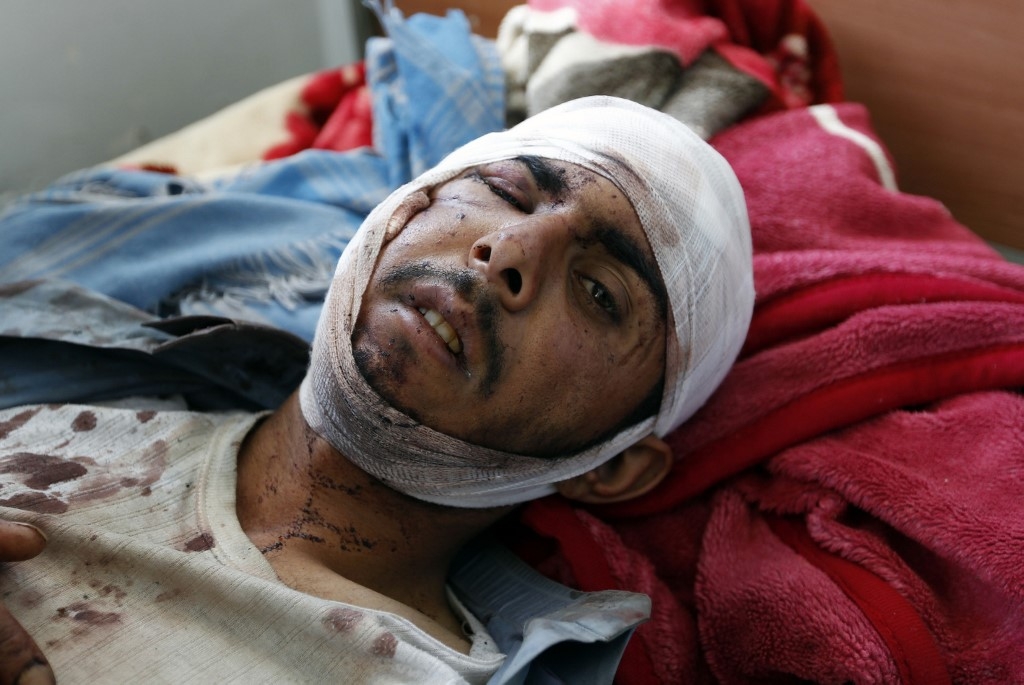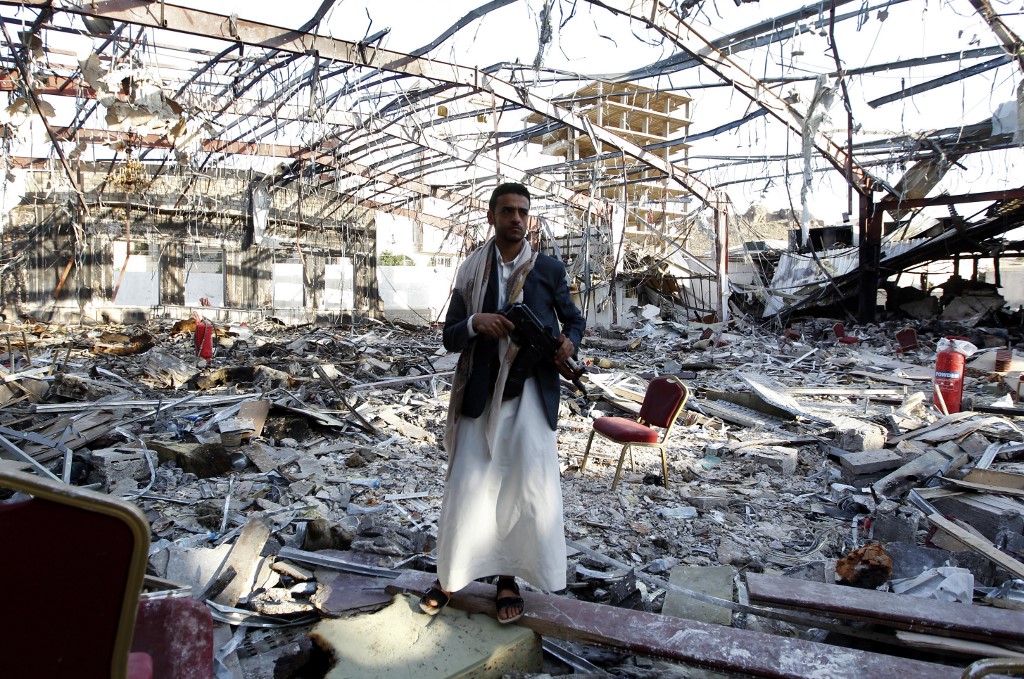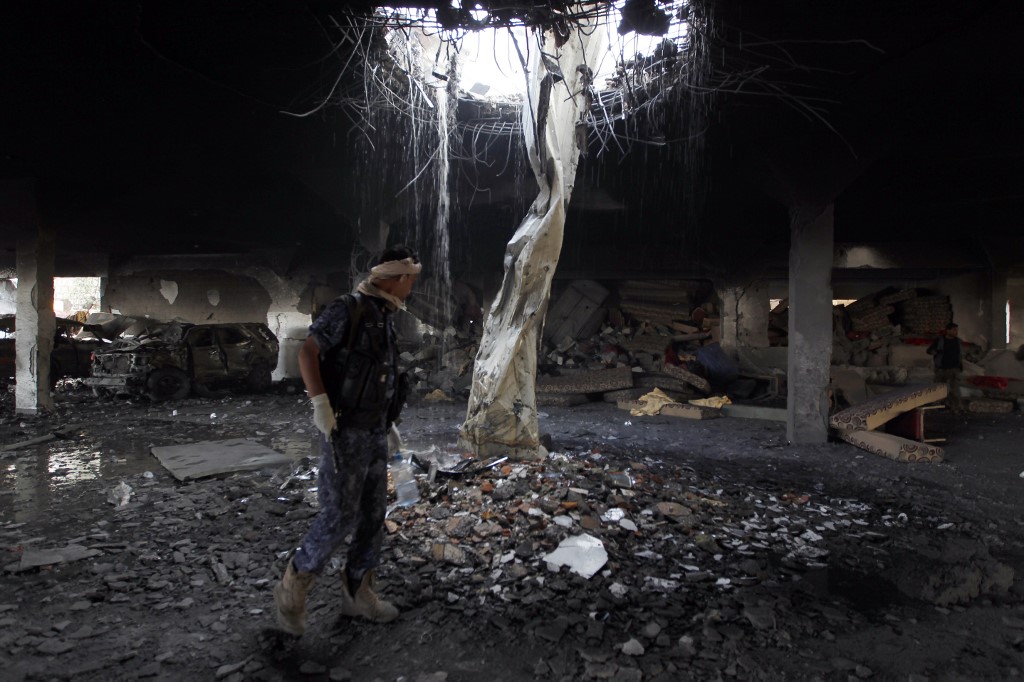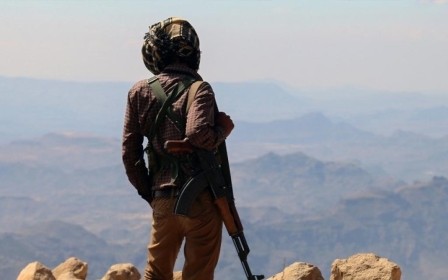'The destiny they deserve': Yemen's funeral attack survivors wait on justice

One minute, the al-Rowaishan family was in the Al-Kubra community hall, receiving condolences from hundreds of visitors for a family member who had died.
The next minute, two Saudi-led coalition air strikes hit, smashing through the centre’s roof and setting it on fire, with mourners caught under piles of rubble.
'We lost confidence in the international system of justice and in bringing justice to the oppressed'
- Qaed Abdullah al-Jawfi, 28, Yemeni army colonel
One-hundred and thirty-seven people were killed and nearly 700 injured in one of the deadliest attacks of the war.
The al-Rowaishans, who belong to a prominent Sanaa tribe of the same name, lost 30 members of their family alone in the 8 October 2016 bombing.
Initially denying it was behind the attack, the coalition’s investigation team acknowledged responsibility for it a week later, saying it had been misinformed about the target and failed to follow its own rules of engagement.
New MEE newsletter: Jerusalem Dispatch
Sign up to get the latest insights and analysis on Israel-Palestine, alongside Turkey Unpacked and other MEE newsletters
Human Rights Watch later found that munitions in the attack included a US-made GBU-12 Paveway II 500-pound laser-guided bomb.
No one has ever been held accountable.
But this week, a team of lawyers representing the Rowaishan family on behalf of a relative who was killed in the attack have asked UK and US police to investigate what happened and look specifically at a list of Saudi and Yemeni suspects they say were at the highest level of responsibility in overseeing the strikes.
Evidence gathered since the attack, the lawyers say, shows that the officials responsible committed war crimes, unlawful killings and torture. Under universal jurisdiction, both countries can try any national accused of committing serious international crimes in another country.
News of the legal action was met with a bittersweet reaction among the relatives of those killed and injured.
Qaed Abdullah al-Jawfi, 28, lost his father, Abdullah, and his brother, Hani, in the bombing, which he described as a massacre that had brought grief to every household in the area. It's a day the colonel in the Yemeni army said he would rather not discuss.
Jawfi acknowledged the complaints filed with the UK's Metropolitan Police and the US Department of Justice this week with a shrug – and then anger. After five years of war, he and other Yemenis, he said, no longer have any faith in the international community.
'Nothing can lessen our misfortune but our absolute faith that the perpetrators will face the destiny they deserve'
- Nasr al-Rowaishan, trader
“We lost confidence in the international system of justice and in bringing justice to the oppressed,” he told Middle East Eye. “The world has become a hypocrite with leaders prioritising making money over bringing justice to the people over war crimes.”
“Nothing will heal our glory but the death sentence of the killers,” he said. “Our martyrs’ bloods will not go in vain.”
Nasr al-Rowaishan, 33, a member of the family which has brought the legal action, said he welcomed the complaints.
“The funeral bombing is a war crime against humanity and all religions denounce it,” he said. “Grief and pain overwhelmed us. A massacre that we did not imagine happened. Nothing can lessen our misfortune but our absolute faith that the perpetrators will face the destiny they deserve.”
Despite his loss and the years that have passed without action, al-Rowaishan, who works as a trader, said his faith in international justice remained intact.
“There are still a lot of free people in this world who will not accept the passage of perpetrators without punishment. The investigation of the people who stand behind such crimes helps to limit the commitment of such crimes,” he said.
Justice or not, many of those who lived through the attack said they simply wished they could forget that day, but struggle to move on because their bodies are permanently marred.
For the past two years, Abdulsalam Ghalib, 45, who was injured at the funeral, said he has moved from hospital to hospital in Sanaa to receive continuing treatment, but still has visible cuts and bruises.
“When the first attack happened, I was near to the gate together with four friends and I was able to flee with two friends. We were burned and my leg was broken while one of my friends was killed because he ran inside the hall and burned,” Ghalib, who is currently unemployed, told MEE.
“I cannot forget the picture of my friend Ridhwan al-Khazan while he was burning,” he said. “It is the worst thing that hurts me.”
Middle East Eye delivers independent and unrivalled coverage and analysis of the Middle East, North Africa and beyond. To learn more about republishing this content and the associated fees, please fill out this form. More about MEE can be found here.





